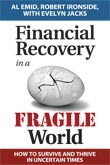Last updated: September 27 2011
Government Debt and the Inflation Tax
An Excerpt from Financial Recovery in a Fragile World
The Greek financial crisis has been dominating the news and it has had significant effect on the confidence of investors, who are looking for a safe place to park their money. Inflation has a lot to do with both issues, as explained in this soon-to-be-published book from Knowledge Bureau, by co-author Robert Ironside below:
In simple terms, inflation erodes the value of money. More money is required to purchase the same basket of goods and services. When it comes to investing, a lender wants to be compensated for the loss of purchasing power that might occur over the period of the loan. If lenders don't obtain sufficient compensation for inflation, as often happens during periods of rising inflation, the real yield earned on their money is negative.
During a period of high and rising inflation, bond investors of the past have consistently under estimated the impact of inflation on their securities. For example, from 1966 to 1981, bond investors had a negative, real annually compounded rate of return of -4.2% in the United States[1].
To be successful over time, a bond investor wants to obtain a realized yield that compensates for both the deferral of consumption (the real interest rate), as well as compensation for the loss of future purchasing power that occurs due to inflation. The problem arises when inflation unexpectedly spikes upward, after a bond has been purchased. In this case, the yield-to-maturity that the bond was purchased to provide is not sufficient to compensate for the unexpected loss of purchasing power.
It is for this reason that inflation is sometimes described as just another form of taxation and it is a form of taxation that is likely to be widely deployed as governments in all developed nations attempt to work their way out of their massive debt problems. Next time, we'll explain why.


